Find the biographies for participants in the Stratford Festival Laboratory 2018 below.
Artists/Actors
Academic Participants (with paper abstracts)
Artists/Actors
Guest Artist Bios
Cole Alvis is proud of their Métis-Irish/English heritage from the Turtle Mountains in Manitobah. An acclaimed actor, theatre creator & artistic leader, their (gender neutral pronoun) creative process is infused with rigour, inclusivity and community building. Cole is the leader of the Indigenous Performing Arts Alliance, Artistic Producer of the queer theatre company lemonTree creations and a finalist for the 2016 Toronto Arts Foundation Emerging Artist Award. Select credits include dramaturging a new play by Donna-Michelle St. Bernard called The House You Buildfor the Gordon Tootoosis Nīkānīwin Theatre (Saskatoon, SK), as well as mentions like “outstanding performance” in Nelly Boy, and “outstanding direction” of ROWby T. Berto at the SummerWorks Festival (NNNN – Now Magazine). Cole was one of the creator / performers for the Dora-nominated Gorey Story (The Thistle Project). Recently, Cole was invited to the inaugural Indigenous Directors Lab at the Stratford Festival of Canada, performed in Body Politicby Nick Green (lemonTree creations / Buddies In Bad Times Theatre) and directed a new play workshop of the solo show bugby Yolanda Bonnell (SummerWorks).
Logan Brideau is making his Stratford Festival debut this year playing Tobias Britt in The Music Man. Credits elsewhere include Greg Scott in Marathon of Hope: The Musical, Anne of Green Gables, The Music Man, The Wizard of Oz(Drayton Entertainment), and JoJo in Seussical the Musical(KW Musical Productions). Logan was a member of the 2015 Show Choir Junior Championship winning team, Kitchener Waterloo Glee. Online:Instagram: @loganbrideau.
Emma Frankland is an award winning performance and theatre artist working in the UK and internationally. Her anarchic adaptation of Don Quijotewas featured in the British Council Showcase at the 2013 Edinburgh Festival, and she is the director of None of Us is Yet a Robot – a contemporary performance company that create groundbreaking performance work based on transgender identities & the politics of transition (www.notyetarobot.co.uk). Emma trained at the Central School of Speech & Drama in Classical Acting. For the Globe Theatre she has directed and performed in Read Not Dead readings and revivals of 16th century plays including The Woman in the Moon,Sappho & Phao, and The Love of King Davidfor the Fair Bethsabe. She played Bottom in ‘Dreamspace’ – the Globe Education Department’s puppetry adaptation of A Midsummer Night’s Dream. Among other projects, Emma is currently working on a large scale outdoor revival of John Lyly’s Galatea, in collaboration with Andy Kesson, Myriddin Pharo, and Victoria Abbot.
Gein Gizhii Kwe Wong is an interdisciplinary director and artist of First Nations and Asian descent who is Two-Spirited and Queer. She sits on the Board of Directors of the Toronto Arts Council, and is a recipient of the 2014 Ken McDougall Director’s Award. Gein is Artistic Director of Eventual Ashes, a co-owner of the world’s oldest LGBT bookstore, Glad Day Bookshop, and a member of the Indigenous Two-Spirit drum group, Balance Bringers. She was a Canadian Stage Director in Residence, a Harbourfront Centre Resident Artist, a two-time Philadelphia Asian Arts Initiative Resident Artist, collaborated on a New York HERE Arts Centre Residency and a member of the Native Earth Performing Arts’ Animikiig Creation Unit. She conceived and directed “Say Their Names, Remember”, a 500 person performance piece which opened the Ai Weiwei exhibit at the Art Gallery of Ontario. She co-created “The Forgetful City,” a site specific interactive video installation that reopened the RC Harris Water Filtration Plant in Toronto – an art-deco castle closed to the public for a decade due to 9/11. At World Pride 2014 she commemorated the 45th anniversary of the Stonewall Riots by creating a large scale immersive performance experience to remember Stonewall. She co-created The Interstellar Spadina House Museum Tour and Cobechenonk an immersive canoe trip through time up the Humber River. Gein is a main organiser for the Tkaronto Soaring Eagle Camp which occupied the front of Toronto Old City Hall Courthouses in response to the Tina Fontaine and Colton Boushie Trials. She recently returned from unceded Coast Salish Territories where she supported the Tsleil-Waututh, Squamish, Musqueam, Secwepemc Nations in their efforts to stop the expansion of the Kinder Morgan Pipeline.
Stratford Actors:
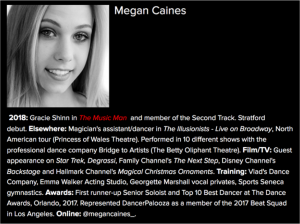
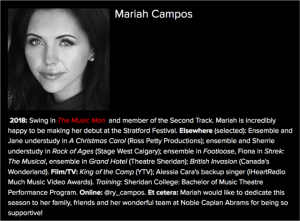
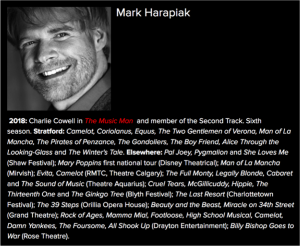
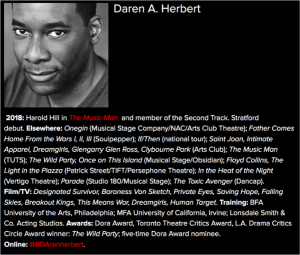
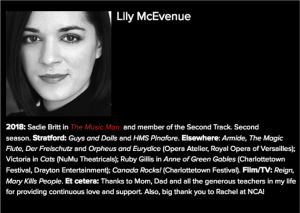
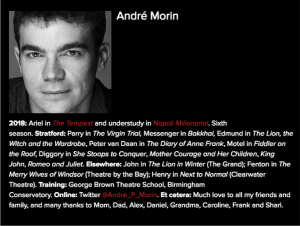
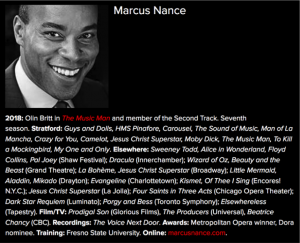
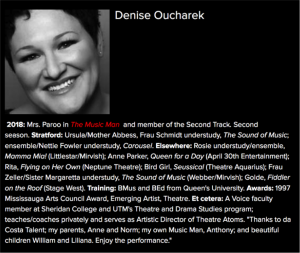
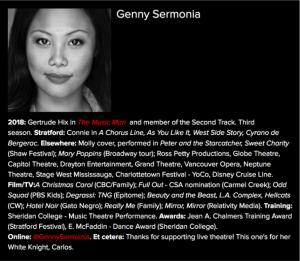
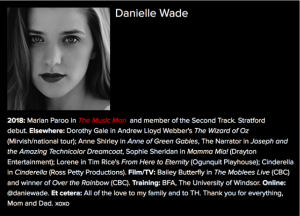
Academic Participants:
Organizers:
Dr. Peter Cockett is Associate Professor in the Theatre and Film Studies programme at McMaster University’s School of the Arts where he teaches acting, devising, and collective creation. Peter is a leading practitioner of Performance as Research (PaR) in early modern theatre studies. His work in this field includes three major international conferences focused on PaR: Shakespeare and the Queen’s Men (2005), Chester 2010: Peril and Danger to her Majesty, and Performance as Research in Early English Theatre Studies: The Three Ladies of Londonin Context (2014). He has directed 10 PaR productions of medieval and early modern plays, and organised three intensive PaR workshops for scholars and practitioners. His research on the Queen’s Men is published on his Performing the Queen’s Menwebsite and on Queen’s Men Editions,for which he is General Editor (Performance). He has published articles on early modern performance practices and the use of performance as a tool for scholarship and research. At McMaster, he has directed Henry V (2005), Eurydice (2008), Unity-1918(2012), and Lope de Vega’s Women and Servants (2018), and has created several new plays, including In The Kitchen (2006), lovedotcomm (2007), Stressed! A Musical Review (2010), and an adaptation of Shakespeare’s Hamlet entitled Hamlet’s Dorm (2011). Peter is also a professional actor. Most recent credits include: American Gods(Starz)) Private Eyes(Global), Saving Hope(CTV),The Memory of Water (Tarragon Theatre/Elgin Winter Garden), Murdoch Mysteries (Shaftesbury Films), Recipe for a Perfect Christmas (Lifetime), and Head in the Clouds (Directed by John Duigan).
Dr. Melinda Gough is Associate Professor in McMaster University’s Department of English and Cultural Studies and the Gender Studies and Feminist Research Graduate Programme, where she teaches courses on Shakespeare and his contemporaries and on feminist theory and activism. A specialist in English and continental Renaissance literature, drama, and performance history, Melinda has published numerous articles and book chapters and is the author of Dancing Queen: Marie de Médicis’ Ballets at the Court of Henri IV(forthcoming with University of Toronto Press, Nov. 2018). Since 2013, she has served as Editor of the academic journal Early Theatre: A Journal Associated with the Records of Early English Drama. Her interest in Performance as Research (PaR) began with her work, in 2014, as co-organizer of the international conference Performance as Research in Early Theatre Studies: The Three Ladies of London in Context. Currently, Melinda is editing the anonymous 17thcentury tragicomedy Swetnam the Woman-hater Arraigned by Womenfor the Revels Plays (the Festival will be piloting her edition for a staged reading, as part of its Wordplay series, on Friday September 21).
Invited Scholar Participants
Dr. Roberta Barker is Associate Professor of Theatre at Dalhousie University and author of Early Modern Tragedy, Gender, and Performance, 1984-2000 (Palgrave Macmillan, 2007). Her work on the relationship between boy actresses and female performers in early modern England has appeared in journals such as Shakespeare Bulletin and Literature Compass, as well as in numerous edited collections. A working director of theatre and opera, she has explored early modern performance practice in stagings of Troilus and Cressida, Fuente Ovejuna, and The Witch of Edmonton; an article on the latter production appeared in Early Theatre (2009). She has also led sessions on theatrical praxis-as-research at the Canadian Association for Theatre Research and the international conference “Renaissance Drama in Action.” Her current research project, A Very Pretty Fellow: In Search of Richard Robinson, examines the life and times of one of the leading boy actresses of Shakespeare’s company, the King’s Men.
ABSTRACT: “A Tragedienne in Trousers: Imagining The Maid’s Tragedy through the Career of Richard Robinson”
Pamela Allen Brown is Associate Professor of English at University of Connecticut, Stamford. A founding organizer of Theater without Borders (TWB), she has directed and organized demonstrations with actors at UConn and at TWB conferences abroad. She has also written and directed short films about the Renaissance actress: The Innamorata(tdf.org) and The Amorous Debate on Arms and Letters(YouTube). She has just completed a manuscript about the impact of star actresses and their roles on English theater, entitled The Diva’s Gift: The Italian Actress and the Shakespearean Stage, for which she won an NEH fellowship. Publications include Better a Shrew than a Sheep: Women, Drama and the Culture of Jest in Early Modern England, Women Players in Early Modern England: Beyond the All-Male Stage(with Peter Parolin), and As You Like It: Texts and Contexts(with Jean E. Howard).
ABSTRACT: “Art of the Zinger: Female Sdegnoand Cut-and-Thrustall’italiana”
Dr. Erin Julian is a SSHRC Postdoctoral Fellow researching representations of gender and sexual violence in Shakespeare productions on contemporary commercial stages (including the Stratford Festival, Shakespeare’s Globe, and the Royal Shakespeare Company). Her work explores how violence is embodied and how these embodiments speak to contemporary conversations on rape culture. With Dr Kim Solga, she is writing ‘Practicing Diversity at the Stratford Festival: Shakespeare, Performance, and Ethics in the Twenty-First Century’ for the Arden Research Companion to Shakespeare and Contemporary Performance (Bloomsbury, forthcoming 2019) which takes as its case study Keira Loughran’s trans-positive production of The Comedy of Errors. Julian is co-editor of The Dutch Courtesan (OUP, forthcoming 2020), dramaturge/performance note editor for Peter Cockett’s 2015 Three Ladies of London production (for the 2015 ‘Performance as Research in Early Theatre Studies’ conference), and previously completed MA work on boy actors and gendered performance on the early modern English stage.
ABSTRACT: “Violence and Romance: Reclaiming the Heroine in Contemporary Cymbeline”
Dr. Natasha Korda (Ph.D. Johns Hopkins University) is Professor of English and incoming Director of the Center for the Humanities at Wesleyan University. Her research interests include early modern English drama, theatre history, women’s social, economic and legal history, and material and visual culture studies. She is author of Labors Lost: Women’s Work and the Early Modern English Stage (2011) and Shakespeare’s Domestic Economies: Gender and Property in Early Modern England (2002), and co-editor of Working Subjects in Early Modern English Drama (2011) and Staged Properties in Early Modern English Drama (2002). Dr. Korda has served on the editorial boards of Renaissance Quarterly and Early Modern Women: An Interdisciplinary Journal, the executive boards of the Modern Language Association, and the Renaissance Society of America, and the Board of Trustees of the Shakespeare Association of America. Dr. Korda is currently editing the Norton Critical Edition of Shakespeare’s Twelfth Night.
ABSTRACT: “Gendered Footwork on the Early Modern Stage”
Dr. Clare McManus is Professor of Early Modern Literature and Theatre at the University of Roehampton. Her books include Women on the Renaissance Stage (2002) and Early Modern Women’s Performance and the Dramatic Canon (in progress, supported by Leverhulme Trust, Folger Shakespeare Library and Huntington Library fellowships). She has co-edited a forum on Worldy Women: Cosmopolitan and Transnational Female Performance in Early Modern Europe (Renaissance Drama 2016), and a special issue of Shakespeare Bulletin (2015) on Renaissance Women’s Performance and the Dramatic Canon, which includes her essay ‘”Sing It Like Poor Barbary”: Othello and Early Modern Women’s Performance’. Dr. McManus is a textual editor of Shakespeare and early modern plays for Arden, Norton Shakespeare, Routledge and OUP. At Roehampton she teaches Staging Gender: Shakespeare to Behn; at Shakespeare’s Globe she gives MA seminars on women’s performance, and works with actors and directors on pre-show lectures and study days.
ABSTRACT: “Cross-dressed Duelling, the English Boy Actor, and Women’s Feats of Activity”
Dr. Lucy Munro is Professor of Shakespeare and Early Modern Literature at King’s College London. She is the author of Children of the Queen’s Revels: A Jacobean Theatre Repertory (Cambridge UP, 2005) and Archaic Style in English Literature, 1590-1674 (Cambridge UP, 2013); her work as a textual editor appeared most recently in her edition of Dekker, Ford, and Rowley’s The Witch of Edmonton (Arden Early Modern Drama, 2016). Her forthcoming book, Shakespeare in the Theatre: The King’s Men, looks in detail at questions of casting in Jacobean and Caroline drama. She draws regularly on Performance as Research approaches, notably in her editing of The Queen and Concubine and The Demoiselle for Richard Brome Online, which included rehearsal workshops with actors, and in her work for Before Shakespeare, which involves productions, staged readings, and performance workshops drawing on such materials as plays, letters, and lawsuits.
ABSTRACT: “From Aspatia to Amintor (and Back Again?): Casting, Gender, and the Actor’s Career”
Dr. Elizabeth Cruz Petersen is Adjunct Professor at Florida Atlantic University, in the department of Languages and Linguistics. As a scholar, playwright, actor, and director, Dr. Petersen’s interests lie in the areas of cognitive studies (specifically somaesthetics) and early modern Spanish theater. Focusing on the relationship between body, mind, and environment in the context of early modern Spanish performance, her book Women’s Somatic Training in Early Modern Spanish Theater (2017) demonstrates how the actress subscribed to various somatic practices in an effort to prepare for a role. Her published articles and book chapters appear in peer-reviewed journals and anthologies such as Comedia Performance, Journal of Somaesthetics, Cognitive Approaches to Early Modern Spanish Literature, and Women Warriors: Spirit and Voice in Early Modern Spain (forthcoming). She has presented papers and participated in theatre workshops at major conferences such as AHCT, ATHE, and MLA. She also teaches an upper-division course, “Staging Women in the Renaissance,” that studies how Spanish and English actors trained.
ABSTRACT: “Swordplay Uncloaked: Women Wielding Swords in Ana Caro’s Valor, agravio, y mujerand Lope de VegasLa pobreza estimada”
Dr. Edward “Mac” Test is Professor of English and incoming Chair of the English Department at Boise State University. His book Sacred Seeds: New World Plants in English Literature is forthcoming in January 2019 from U Nebraska Press. Dr. Test has published several articles on Mesoamerican culture in English literature and is the recipient of grants and fellowships from the Idaho Humanities Council, the NEH Summer seminar, and the Huntington, Folger Shakespeare, and John Carter Brown libraries. He is also a poet and translator of Spanish. Dr. Test has published four book translations. We will be using his translation of the Spanish play La Monja Alférez (1626) in our workshop scenework.
ABSTRACT: “Catalina de Erauso, Nature, and Gender in Montalbán’s The Lieutenant Nun”
Dr. Ellen Welch is Associate Professor of French at UNC-Chapel Hill. Her research specializes in early modern French literature with a focus on theatre and performance. She has published on plays by Molière, Rotrou, Scudéry, and Tristan l’Hermite and on casting and costuming in 17th-century court ballet. Her most recent book, A Theater of Diplomacy: International Relations and the Performing Arts in Early Modern France (Penn, 2017), investigates how multimedia theatrical entertainments mediated France’s diplomatic relationships within and beyond Europe from 1565 to 1715. She teaches “Imposteur!,” an undergraduate course on themes of impersonation and the performance of identity in French-language theater from Molière and Marivaux to La Cage aux Folles, as well as graduate seminars on theater and performance studies. She has led public discussions in conjunction with performances of Molière plays for the Public Humanities program at UNC and for the Triad Stage theater in Greensboro, North Carolina.
ABSTRACT: “The Essence of Gender: Iphis et Iante and the Tradition of Female Performance in Pastoral Plays”
Scholar Observers
Dr. Barbara Fuchs is a Professor in the department of Spanish and Portugese, and in the department of English, at UCLA. Her research centres on European cultural production from the late fifteenth through the seventeenth centuries, with a special emphasis on literature and empire, and on theater and performance in transnational contexts. She directs the UCLA Working Group on the Comedia in Translation and Performance and its “Diversifying the Classics” initiative (http://diversifyingtheclassics.humanities.ucla.edu/). Her most recent book is The Poetics of Piracy: Emulating Spain in English Literature (2013), and she is the English translator of Women and Servants, Lope de Vega’s newly rediscovered play, with a critical introduction and notes (2016). Current projects include a Norton Critical Edition of Spanish Golden Age theater and a bilingual anthology of monologues from Hispanic classical drama.
Dr. Zoe Hudson recently completed her doctorate at the University of Kent, following several years working in the museum sector in London. Her thesis explores the unpublished 16th century diaries of Richard Stonley, who is the earliest known purchaser of a work by Shakespeare. Dr. Hudson has a particular interest in early modern gender relations and working practices; she is also a theatre costume designer and maker.
Dr. Stephen Purcell is an Associate Professor in the Department of English and Comparative at the University of Warwick. He also directs for the theatre company The Pantaloons. Dr. Purcell’s research focuses on the performance of work by Shakespeare and his contemporaries on the modern stage and on screen. Specifically, his interests include theories of the audience, space, popular culture, parody, adaptation, and comedy, and in ‘Shakespeare’ as a 20th- and 21st-century cultural phenomenon. Dr. Purcell regularly leads practical workshops on Shakespeare at conferences and elsewhere, and has published on Performance as Research. His books include Shakespeare in the Theatre: Mark Rylance at the Globe (Arden Shakespeare, 2017), Shakespeare and Audience in Practice (Palgrave MacMillan, 2013), and The Shakespeare Handbooks: The White Devil (Palgrave, 2012).
Dr. Callan Davies is Research Fellow at the University of Roehampton, London, where he is part of the Before Shakespeare team (www.beforeshakespeare.com) researching the development of playhouses in Elizabethan London and the plays and people associated with these commercial buildings. He is the editor of the Curtain playhouse records for Records of Early English Drama, and he has recently finished his monograph, Strangeness in Jacobean Drama (under consideration). His work for Roehampton also includes facilitating and documenting the relationship between the department’s early modern research and its wider professional, economic, and cultural impact. He is helping coordinate the digital and social media presence of the Lab work for the project and facilitating capturing its impact.
